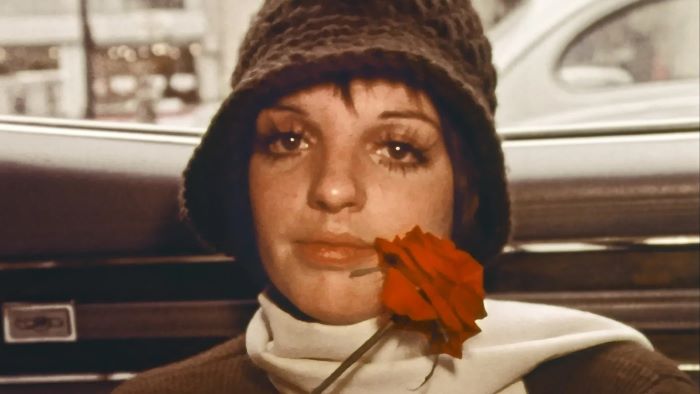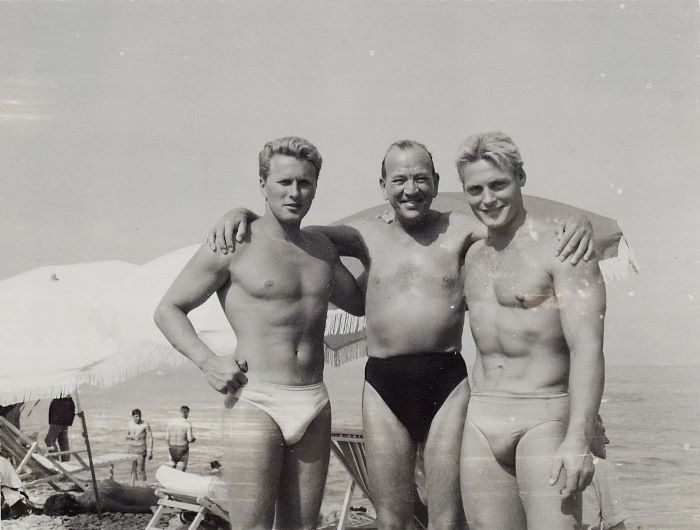The 26th annual Provincetown International Film Festival showcased over 100 films, from June 12th through the 16th. The programming included a grab bag of movies that have played the festival circuit before their upcoming theatrical releases, as well as appealing films that haven’t yet landed a U.S. distributor. Below are four such films that enhanced the lineup.
The festival was the perfect place to catch Provincetown–set High Tide. Written and directed by Marco Calvani, and starring his partner, Marco Pigossi, in the lead role, the story centers upon Lourenço, an undocumented Brazilian immigrant, working in Provincetown as a house cleaner. In the aftermath of a recent breakup, he meets a romantic interest, Maurice (James Bland), there for a fleeting few days on vacation. As their relationship quickly develops, the film delves into simmering class and racial disparities in the Provincetown community. Maurice, who is Black, notes the lack of White people around him. Another moment exposes the divide of the Black behind-the-scenes kitchen staff in a restaurant and its all-white patrons.
Adding to the feel of both isolation and intimacy, the film eschews larger gatherings, such as a tea dance, for individual homes and apartments and the outer beaches, where Lourenço goes to de-stress or escape for a swim. The ensemble is strong overall, including Pigossi’s detailed and believable turn, and as well as a standout, the very moving performance from Bill Irwin as Lourenço’s lonely neighbor. Subtly, he reveals an attraction and longing for Lourenço, and also some racial bias in an addled moment of panic when thinks Maurice is an intruder. In a understated role, Marisa Tomei plays a floaty artist, newly partnered with a wealthy woman, who hires Lourenço, alongside with her bitter ex-husband (Sean Mahon), to paint her house in an unreasonable amount of time. She takes a liking to Lourenço, and the two establish a sort of friendship and understanding. The performances are indebted in part to the strength of Calvani’s script, which avoids broadness and sweeping generalizations, giving the characters novelistic complexity.
The film is wonderfully shot by Oscar Ignacio Jiménez, taking in the incredible sunlight and beauty of its locations. The score was composed by Argentinian cellist Sebastian Plano. Its emotionally charged strings are reminiscent of Nicholas Brittell’s work on Moonlight. Calvani’s rich understanding of this setting—its beauty, quirks, barriers, complexities, and embracing of queerness—makes High Tide one of the more vibrant films I’ve seen this year so far.
Provincetown also featured a few beguiling documentaries about a wide range of entertainers. Bruce David Klein’s Liza: A Truly Terrific Absolutely True Story begins with some groan-worthy glitzy Broadway computer graphics in its title cards, but soon settles into a roomy and entertaining watch. Like the film itself, Liza Minelli can be a bit over-the-top: the camera shows off one of her rooms of Warhols of her, her mother Judy Garland, and Elizabeth Taylor, with bright red accents—throw pillows and candles—all around. Ultimately, you can’t help but love her tenacity and zeal.
The documentary traces her ups and downs, relationships, addictions, and the tragedy of her mother’s death, but doesn’t dwell upon tabloid fodder. Thankfully, Klein seems less interested in exploiting the kookiness of Minelli—her looks and divorces often derided in the press— and embraces them. The well-assembled clips are a reminder of her talents. She especially shines in scenes from Bob Fosse’s 1972 double whammy of Cabaret and the lively Liza with a Z television concert special.
Michael Feinstein, Joel Grey, Ben Vereen, longtime friend Mia Farrow, and Minelli herself offer great, peppy, and pat commentary. When the documentary invokes Minelli’s ill-fated marriage to David Gest, who allegedly took advantage of Minelli emotionally and financially, her friends rally around her. (Farrow amusingly says, “One shouldn’t speak ill of the dead, but…” getting the last word on that subject.) Many, including Vereen, effuse over Liza’s professionalism and heart. The sincerity of the talking heads lends a warm, sympathetic portrait that should appeal to her fans and those who may not know much about her.
In the same celebratory vein, Mad About the Boy: The Noël Coward Story revels in the career of Noël Coward, the esteemed English playwright, composer, and performer. Coward grew up poor with no formal education, but stealthily created his own persona: a witty, impeccably dressed erudite. He was a very public figure, but aloof and private about his own personal life, closeted throughout his lifetime. (The film relays the constricting views of his time, including Britain’s criminality of homosexuality.) Coward’s output in stage, music, film, and television would be dizzyingly accomplished. His early plays, with dialogue laden with English context and humor but paced with the quickness of the then-American acting style, garnered him acclaim and attention. Coward’s career had its ups and downs, especially in the 1950s and 1960s, as the naturalistic, gritty kitchen-sink style began to eclipse the stylized. He does find success, however, performing live in Las Vegas.
Directed by Barnaby Thompson, the documentary is straightforward, with crackling archival footage. The most impactful may be some of his work in film, famously David Lean’s Brief Encounter. Scenes from Coward and Lean’s patriotic 1942 film In Which We Serve are particularly moving. Thompson also utilizes voice-overs by Alan Cumming and Rupert Everett, and, perhaps in a nod to looking toward Coward’s influence on more current artists, employs more recent cover versions of his songs by the likes of Adam Lambert than older renditions. Because of Coward’s aloofness and the cradle-to-grade format, the documentary can be a bit on the plodding side at times, but still, it’s a fully-embodied portrait of a master.
Stephen Soucy’s Merchant Ivory is a dishy documentary on the production team, best known for their stellar cinematic adaptations of literary works such as Remains of the Day, Howards End, Maurice, and A Room with the View. Behind the curtain of these elegant, meticulous-looking films was often disorder. Ismail Merchant, a larger-than-life-personality, often led hectic sets with crew not getting paid on time. A charismatic figure, he’d still somehow find ways of winning them back on subsequent projects.
Merchant and Ivory were romantically involved for decades. Ivory, more reticent, was and is still somewhat private about his sexuality. Currently 96, he has become been more open lately in the wake of his success with Call Me by My Name, in his 2021 memoir Solid Ivory, and also here in interviews. I was stunned looking at clips from his oeuvre, by how beautifully crafted and filmed they were (especially Howards End) and their wide range (from his Indian-set early pictures to Slaves of New York). Merchant Ivory’s last effort together is the underrated City of Your Final Destination, personally one of my favorites. However, the documentary mentions Anthony Hopkins’s lawsuit against the team for unpaid wages on that film, exposing an unfortunate aspect of Merchant/Ivory’s otherwise artistically vibrant collaboration.
The film features the likes of Hugh Grant, Emma Thompson, Helena Bonham Carter, Vanessa Redgrave, and the brilliant costume designer Jenny Beavan. The Merchant/Ivory team, along with collaborators screenwriter Ruth Prawer Jhabvala and composer Richard Robbins, all lived near each other in the Hudson Valley at one time. The complicated love, prickliness, and tumult between all of them that emerges here mirrors a rich E.M. Forester novel.
Unlike the movies earlier mentioned, thus far only Merchant Ivory has a U.S. distributor, Cohen Media Group.
Finally, with back-to-back screenings, some of which were somewhat heady, it was a treat to slip into a poolside evening screening of David Mirkin’s 1997 film Romy and Michele’s High School Reunion. The comedy remains consistently funny, shining more than ever, with an appealing ’80s bubblegum pop soundtrack and dynamic turns by Mira Sorvino and Lisa Kudrow, Janeane Garofalo, and Camryn Manheim. I caught the movie under the stars and the appropriately hot pink lights on the back patio of the Crown & Anchor inn.



















Leave A Comment